Beststudyguru
On this page, you find all documents, package deals, and flashcards offered by seller BESTSTUDYGURU.
- 2464
- 0
- 39
Community
- Followers
- Following
51 Reviews received
2520 items
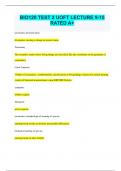
BIO120 TEST 2 UOFT LECTURE 9-15 RATED A+
taxonomic diversification divergence causing a change in species name Taxonomy The scientific study of how living things are classified; like the vocabulary to the grammar of systematics Carol Linnaeus "Father of Taxonomy"; established his classification of living things; famous for animal naming system of binomial nomenclature; came BEFORE Darwin sympatric within a region Allopatric across regions taxonomic (morphological) naming of species naming based mostly on distinct measura...
- Exam (elaborations)
- • 25 pages •
taxonomic diversification divergence causing a change in species name Taxonomy The scientific study of how living things are classified; like the vocabulary to the grammar of systematics Carol Linnaeus "Father of Taxonomy"; established his classification of living things; famous for animal naming system of binomial nomenclature; came BEFORE Darwin sympatric within a region Allopatric across regions taxonomic (morphological) naming of species naming based mostly on distinct measura...
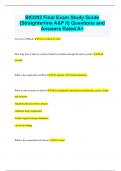
BIO202 Final Exam Study Guide (Straighterline A&P II) Questions and Answers Rated A+
Viscosity of Blood? twice as thick as water How long does it take for a drop of blood to circulate through the entire system? 20-60 seconds What is the composition of Blood 55% plasma, 45% formed elements, What are the fucntions of blood? -Moves regulatory and processed molecules, gasses, waste, and nutrients -Regulats pH and osmosis process -Maintain body temperature -Protect against foreign substances -Assist in clotting What is the composition of plasma? 91% water7% proteins 2% oth...
- Exam (elaborations)
- • 14 pages •
Viscosity of Blood? twice as thick as water How long does it take for a drop of blood to circulate through the entire system? 20-60 seconds What is the composition of Blood 55% plasma, 45% formed elements, What are the fucntions of blood? -Moves regulatory and processed molecules, gasses, waste, and nutrients -Regulats pH and osmosis process -Maintain body temperature -Protect against foreign substances -Assist in clotting What is the composition of plasma? 91% water7% proteins 2% oth...

Bio 210 Unit 3 with Complete Solutions
the molecule that stores oxygen in skeletal muscle myoglobin the neurotransmitter released at the neuromuscular juntion acetylcholine an immovable joint found only between skull bones suture a movement which results in the arms being moved away from the body laterally abduction which of the following does not characterize a synovial joint a joint cavity filled with fibrous tissue a slightly movable joint composed of a bar of cartilage symphysis articulations permitting only slight degrees...
- Exam (elaborations)
- • 8 pages •
the molecule that stores oxygen in skeletal muscle myoglobin the neurotransmitter released at the neuromuscular juntion acetylcholine an immovable joint found only between skull bones suture a movement which results in the arms being moved away from the body laterally abduction which of the following does not characterize a synovial joint a joint cavity filled with fibrous tissue a slightly movable joint composed of a bar of cartilage symphysis articulations permitting only slight degrees...
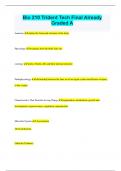
Bio 210 Trident Tech Final Already Graded A
Anatomy studies the form and structure of the body Physiology examines how the body func ons cytology study of body cells and their internal structure Pathophysiology relationship between the func on of an organ system and disease or injury to the system Characteristics That Describe Living Things organization, metabolism, growth and development, responsiveness, regulation, reproduction Muscular System -Locomotion -Heat production (Muscles,Tendons)endocrine system -Regulates body functi...
- Exam (elaborations)
- • 41 pages •
Anatomy studies the form and structure of the body Physiology examines how the body func ons cytology study of body cells and their internal structure Pathophysiology relationship between the func on of an organ system and disease or injury to the system Characteristics That Describe Living Things organization, metabolism, growth and development, responsiveness, regulation, reproduction Muscular System -Locomotion -Heat production (Muscles,Tendons)endocrine system -Regulates body functi...
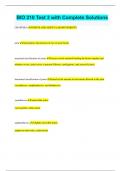
BIO 210 Test 3 with Complete Solutions
CHAPTER 8 JOINTS AND ARTICULAR MOVEMENTS joint articulation; the junction of two or more bones structural classification of joints focuses on the material binding the bones together and whether or not a joint cavity is present (fibrous, cartilaginous, and synovial joints) functional classification of joints based on the amount of movement allowed at the joint (synarthroses, amphiarthroses, and diarthroses) synarthroses immovable joints syn=together, arthro=joint amphiarthroses slightly m...
- Exam (elaborations)
- • 46 pages •
CHAPTER 8 JOINTS AND ARTICULAR MOVEMENTS joint articulation; the junction of two or more bones structural classification of joints focuses on the material binding the bones together and whether or not a joint cavity is present (fibrous, cartilaginous, and synovial joints) functional classification of joints based on the amount of movement allowed at the joint (synarthroses, amphiarthroses, and diarthroses) synarthroses immovable joints syn=together, arthro=joint amphiarthroses slightly m...
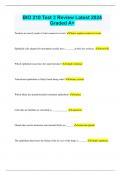
BIO 210 Test 2 Review Latest 2024 Graded A+
Tendons are mostly made of what connective tissue? dense regular connective tissue Epithelial cells adapted for absorption usually have _______ at their free surfaces. microvilli Which epithelial tissue lines the small intestine? simple columnar Transitional epithelium is likely found lining what? urinary system Which likely has pseudostratified columnar epithelium? trachea Cells that are flat/thin are classified as ____________. squamous Glands that secrete hormones into internal fluids a...
- Exam (elaborations)
- • 6 pages •
Tendons are mostly made of what connective tissue? dense regular connective tissue Epithelial cells adapted for absorption usually have _______ at their free surfaces. microvilli Which epithelial tissue lines the small intestine? simple columnar Transitional epithelium is likely found lining what? urinary system Which likely has pseudostratified columnar epithelium? trachea Cells that are flat/thin are classified as ____________. squamous Glands that secrete hormones into internal fluids a...
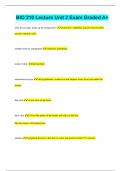
BIO 210 Lecture Unit 2 Exam Graded A+
what tissue types make up the integument? connective, epithelial, muscle (arrector pili), nervous (merkle cells) another term for integument cutaneous membrane study of skin: dermatology subcutaneous layer aka hypodermis, connective and adipose tissue layer just under the dermis thin skin covers most of the body thick skin Covers the palms of the hands and soles of the feet Has five layers of keratinocytes melanin A pigment that gives the skin its color and protects from UV exposurenevu...
- Exam (elaborations)
- • 23 pages •
what tissue types make up the integument? connective, epithelial, muscle (arrector pili), nervous (merkle cells) another term for integument cutaneous membrane study of skin: dermatology subcutaneous layer aka hypodermis, connective and adipose tissue layer just under the dermis thin skin covers most of the body thick skin Covers the palms of the hands and soles of the feet Has five layers of keratinocytes melanin A pigment that gives the skin its color and protects from UV exposurenevu...
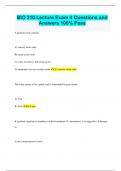
BIO 210 Lecture Exam 4 Questions and Answers 100% Pass
A posterior root contains A) sensory axons only B) motor axons only C) a mix of sensory and motor axons D) autonomic nervous system axons A) sensory axons only The white matter of the spinal cord is surrounded by gray matter. A) True B) False B) False If a patient experiences numbness in the boundaries of a dermatome, it is suggestive of damage to A) the somatosensory cortexB) the thalamus C) one of the spinal funiculi D) the anterior horn of grey matter in the spinal cord E) a spin...
- Exam (elaborations)
- • 22 pages •
A posterior root contains A) sensory axons only B) motor axons only C) a mix of sensory and motor axons D) autonomic nervous system axons A) sensory axons only The white matter of the spinal cord is surrounded by gray matter. A) True B) False B) False If a patient experiences numbness in the boundaries of a dermatome, it is suggestive of damage to A) the somatosensory cortexB) the thalamus C) one of the spinal funiculi D) the anterior horn of grey matter in the spinal cord E) a spin...
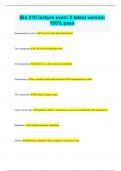
Bio 210 lecture exam 2 latest version 100% pass
Integumentary system consist of skin and its derivatives The integument is the skin covering the body the integument also known as the cutaneous membrane Dermatology its scientific study and treatment of the integumentary system The integument the body's largest organ Layers of the skin epidermis, dermis, subcutaneous layer(not considered in the integument) Epidermis stratified squamous epithelium Dermis deep layer, primarily dense irregular connective tissueSubcutaneous layer deep to de...
- Exam (elaborations)
- • 38 pages •
Integumentary system consist of skin and its derivatives The integument is the skin covering the body the integument also known as the cutaneous membrane Dermatology its scientific study and treatment of the integumentary system The integument the body's largest organ Layers of the skin epidermis, dermis, subcutaneous layer(not considered in the integument) Epidermis stratified squamous epithelium Dermis deep layer, primarily dense irregular connective tissueSubcutaneous layer deep to de...
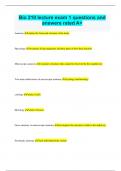
Bio 210 lecture exam 1 questions and answers rated A+
Anatomy studies the form and structure of the body. Physiology examines living organisms and their parts of how they function Microscopic anatomy examines structures that cannot be observed by the unaided eye Two main subdivisions of microscopic anatomy cytology and histology cytology study of cells Histology study of tissues Gross anatomy or macroscopic anatomy investigates the structure visible to the aided eye Systematic anatomy each individual body systemRegional anatomy all the struc...
- Exam (elaborations)
- • 22 pages •
Anatomy studies the form and structure of the body. Physiology examines living organisms and their parts of how they function Microscopic anatomy examines structures that cannot be observed by the unaided eye Two main subdivisions of microscopic anatomy cytology and histology cytology study of cells Histology study of tissues Gross anatomy or macroscopic anatomy investigates the structure visible to the aided eye Systematic anatomy each individual body systemRegional anatomy all the struc...

Edexcel a level geography paper 2 mark scheme june 2023
A LEVEL EDEXCEL FURTHER MATHEMATICS CORE PURE MATHS QUESTION PAPER 1 2024
CBCC-KA Questions and Answers 100% Pass
Edexcel gcse foundation combined science chemistry paper 1 june 2023
Edexcel gcse foundation combined science biology paper 1 june 2023